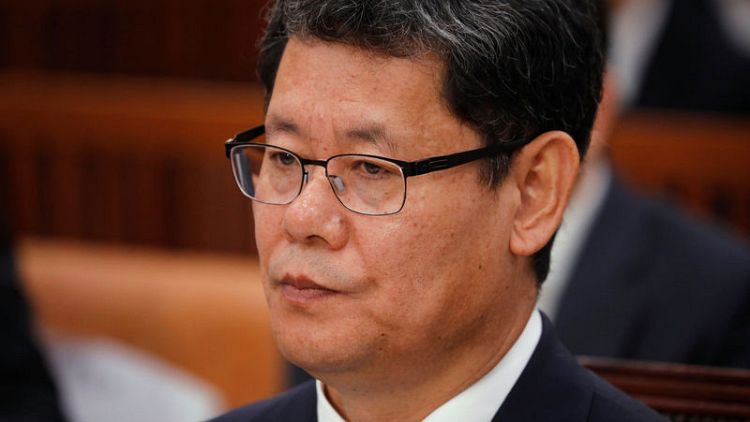By Kevin Krolicki and Jack Kim
SEOUL (Reuters) - Inter-Korea commercial projects that can channel millions of dollars a year to Pyongyang may be used as leverage to boost talks on ending poor and isolated North Korea's nuclear programme, the South's point man on the North said on Thursday.
Unification Minister Kim Yeon-chul said that, while U.S. President Donald Trump and North Korean leader Kim Jong Un had a high level of personal confidence, there was still considerable distrust among aides that was hindering progress in dialogue.
Kim Jong Un and Trump have met twice in high-profile summits but failed to make progress at their second meeting in Hanoi in February on how to dismantle North Korea's nuclear programme in return for ending international sanctions.
"We can use these as leverage in engaging in negotiations with North Korea," Kim Yeon-chul told a group of senior foreign journalists, referring to the Kaesong industrial complex and Mount Kumgang tours, two projects that remain suspended.
"When we create a negotiating package in trying to persuade North Korea that they should take initiatives for denuclearisation, we can use Kaesong and Kumgang mountain project as something to provide to North Korea so that we can draw more actions," he said.
South Korea suspended the Kaesong industrial project in 2016 and tours to Mount Kumgang in 2008, both symbols of cooperation to establish peace between the two Koreas that remain technically at war under a truce ending the 1950-53 Korean War.
Restarting the two, stymied by sanctions on the North, is central to South Korean President Moon Jae-in's "peace economy" vision to foster reconciliation with the North and revitalise the South's moribund economy, which is suffering its worst unemployment in a decade.
The Unification Ministry is the only one of its kind in the world. Kim Yeon-chul was appointed in April after his predecessor was criticised for not doing enough for peace initiatives.
Moon said on Wednesday the North and the United States are in behind-the-scenes dialogue over a possible third summit and Washington has proposed working-level negotiations on the North's decades-old arms programme.
Kim Yeon-chul said the key to making progress at a third summit between Trump and Kim Jong Un is to have a high level of trust, not just between the two leaders but among officials who need to lay the groundwork.
China, despite trade tensions with the United States, had a key role to play, he said, and the two superpowers' cooperation on Pyongyang was crucial.
"One of the lessons (from the Hanoi summit) is that there should not be a second failure in the U.S. and North Korea negotiations," Kim Yeon-chul said.
He was speaking at a roundtable discussion with senior journalists from Reuters, AP, AFP, Yonhap, Kyodo, Xinhua and Tass ahead of a symposium on the Korean peace process hosted by Yonhap on Thursday.
'YONGBYON PLUS ALPHA'
Despite a cordial meeting, Kim Jong Un and Trump walked away from a planned lunch and without a deal in February over disagreement on how much of the North's nuclear programme should be scrapped and on lifting U.N. and U.S. sanctions imposed on Pyongyang.
Trump sought the dismantlement of all of the North's nuclear installations, including shipping weapons and material to the United States, while Kim Jong Un offered to demolish its main Yongbyon nuclear complex, situated about 100 km (60 miles) north of Pyongyang.
Kim Yeon-chul said it was important to recognise the significance of Yongbyon to the North's overall nuclear programme because it is the location of both the plutonium-based nuclear development as well as the newer uranium-enrichment facility.
"Yongbyon does have a high portion of contribution to the North's nuclear weapons programme. So once we dismantle the Yongbyon facility, not only will we be able to stop North Korea from producing plutonium but we'll be able to partly stop them from enriching uranium," he said.
However, in order for the third summit to make real progress, it was important to think about how more can be done to go beyond scrapping the Yongbyon facility.
"As we prepare for the third summit, we need to think about Yongbyon plus alpha, and a very important challenge is how do we define alpha," Kim Yeon-chul said.
Trump said after the Hanoi summit he had raised the issue of facilities beyond Yongbyon, which "surprised" Kim Jong Un. He did not elaborate but U.S. intelligence sources have said the North operates clandestine uranium enrichment facilities elsewhere, including Kangson near Pyongyang.
The Hanoi summit cast doubt on Kim's commitment to denuclearise. There has been little progress since then, with Pyongyang resuming some limited testing of weapons and being aloof towards dialogue offers both from Washington and Seoul.
The North's foreign ministry said on Tuesday Washington continued to act in a hostile manner by extending sanctions, calling the move a challenge to the spirit of Trump and Kim Jong Un's agreement at the first summit in Singapore a year ago.
Trump visits South Korea on Saturday and is planning to visit the Demilitarized Zone separating the two Koreas, where Kim Jong Un and Moon had their historic first summit last year. A U.S. official has said Trump had no plans to meet the North Korean leader there.
(Additional reporting by Hyonhee Shin; Editing by Paul Tait)
